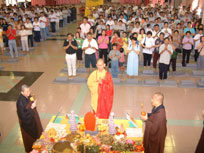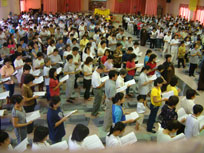Submitted by zhenliang on

August 24, 2003:-
Than Hsiang Temple recently organized a Filial Piety Dharma Assembly to promote the teachings of the Buddha on the importance of the Ullambana Festival and filial piety. A week before the event, beginning from the 18th August, daily chanting of the Amitabha Sutra was held at 8:00pm in the Great Compassion Hall.
On 24th August, devotees proceeded to the Multipurpose Hall located on the 5th floor of Wisma Than Hsiang, bringing with them offerings of fruits, flowers and light. The assembly began with Buddha Name Recitation at about 9:00am followed by offerings to the Buddha. The abbot of Than Hsiang Temple, Ven. Wei Wu gave a dharma talk on the importance of the Ullambana Festival after the proceedings before the lunch break.
After lunch, devotees proceeded to the hall to participate in the Three-Session Pure Land Chanting lead by Ven. Chuan Chao that stretched on till late evening and ended with the burning of the cards at about 6:30pm.
Ullambana celebration has its origin in Buddhism. Ullambana Sutra is a discourse given by the Buddha principally to the Venerable Mogallana on the practice of filial piety. In the sutra, Ven. Mogallana knowing that his mother was full of greed and meanness use his deva vision to find his deceased mother. In his vision he saw that his mother had fallen into the realm of the hungry ghost (Peta). He immediately went to his mother with rice in an alms bowl. His mother was very pleased to see Mogallana. She did not want to share the food with all the other hungry ghosts so she covered the bowl with her left hand after receiving it from Mogallana. However, when she tried to eat the food with her right hand, the food turned into charcoal.
Filled with grief, Mogallana begs Syakymuni Buddha to show him a way to bring salvation to his mother. The Buddha explained to Mogallana that his mother's offences were very great and that Mogollana himself alone could not save her. He would need the help of other Sangha members. The Buddha advised Mogallana to offer rice, fruits other delicacies as well requisites to all the Sangha members in the ten directions. Only the meritorious power of these monks, who hold the precepts completely and purely, can deliver his mother from the great sufferings in the lower realms.
In this way, Mogallana succeeded in rescuing his mother from the hungry ghost realm. Mogallana then asked the Buddha if future followers of Buddha could also practice the Ullamabana offerings. The Buddha replied very gladly that all followers should follow the practice as it would bring similar benefits to the practitioner's parents of the seven births.
In the Sigalovada Sutta, it is stated that the duty of transferring merits to the parents and other relatives falls on the living members of the family. Thus Buddhists undertake to follow different religious functions to transfer merits to the departed so that they may be well and happy. It has become a custom for Buddhists to participate in religious practices and transferring the accrued merits to the intended departed ones. This practice guides the living members to be moral and religious in their day-to-day dealings. At the end of the day both parties benefit from it, as the transference of merits is also a meritorious act.



